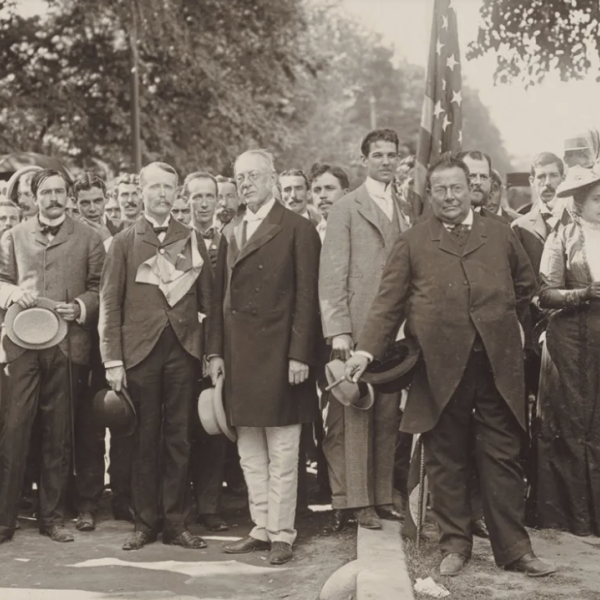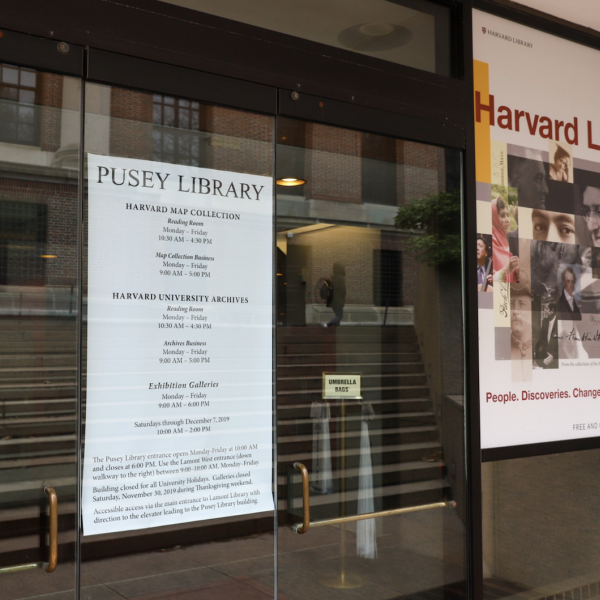Highlights
At Harvard’s primary repository of university records and personal archives, find centuries of people, discoveries, and change on campus and worldwide
- Discover Harvard’s history
- Manage University records
- Engage with archival materials
- Explore digital collections
Research Services
Whether you're embarking on a new research project, or in the middle of an existing one, archivists can help you navigate our collections. We’ll work with you to ensure you're making the most of the materials available in the Harvard University Archives, or help you access materials available online.
Start your historical research on Harvard University with these guides:
Collection Development and Records Management Services
Records Management Services, part of the Harvard University Archives, provides guidance to University staff, faculty, and administrators on how to understand their responsibilities for stewarding and managing their Harvard materials and records.
Our world-class collections are built on generous donations of materials by Harvard community members across the world, and we work with University faculty and staff, as well as individual donors, to identify materials for donation.
What's Happening
Fellowship Opportunities
Teach and Learn with the Harvard University Archives
We welcome and encourage teaching and learning with our collections, and enjoy working collaboratively with you to create engaging, hands-on class experiences.

Archivists are experts in primary source research, analysis, and archival instruction. Whether in person or virtual, our staff is ready to connect students to our collections, and welcome classes at any level or affiliation.
We offer:
- Customized sessions tailored to specific subjects, focusing on primary sources and developing archival research skills
- Help with finding archival material for your class or assignment
- Research guides and instructional support materials tailored to topics and assignments
- Individual research consultations with students
For more information or to schedule a session at the University Archives for your class, please use the Archives and Special Collections Class Request Form.
About
Welcome Message from Virginia Hunt, University Archivist

Welcome to the Harvard University Archives!
Containing 400 years of Harvard, American, and world history, our collections are open to the public and accessible through visits to our Reading Room and exhibition gallery in Pusey Library—both situated right in Harvard Yard—as well as via the constellation of Harvard Library access and discovery portals.
As the primary repository for Harvard’s records and personal archives, you will find over five centuries of innovation, exploration, revolution, and introspection—the soul of Harvard—on campus and worldwide. A product of careful stewardship, community engagement, and interconnectedness, our vast and inclusive collections provide opportunities for remote and hands-on teaching and learning, public and educational programs, individual and scholarly pursuit, and opportunities for interaction between the creators and users of the University Archives.
We invite you to come and experience the people, discoveries, change, and history that make up the Harvard University Archives.
Accessibility of the Harvard University Archives
- The closest accessible entrance to the Harvard Map Collection and Pusey Library is the main entrance to Lamont Library. This entrance can be accessed via Quincy Street and is accessible by automatic door and ramp. There are two elevators that go down to level B of Lamont that connects to Level 1 of Pusey Library and the Harvard University Archives.
- Lamont Library is not open to the public. If you don’t have a Harvard ID please let us know you are coming and will be entering through Lamont so we can alert the guards.
Contact Hannah Hack, hannah_hack@harvard.edu, with questions about accessibility of elevators, study spaces, meeting rooms, and restrooms.
Mission
The Harvard University Archives, a unit of the Harvard Library, has authorization derived from votes of the Harvard Corporation. The Archives supports the University's mission of education and research by preserving and providing access, to the greatest extent possible, to Harvard's historical records; gathering an accurate, authentic, and complete record of the life of the University; and promoting the highest standards of management for Harvard's current records.
History
Authorized by a vote of the President and Fellows of Harvard College in 1851, the Harvard University Archives is believed to be the oldest institutional archives in the United States established by a corporation.
The mission and the authorization for the work of the Harvard University Archives derive from a succession of votes by the Harvard Corporation.
Staff Directory
Administration
- Virginia Hunt, University Archivist
- Juliana Kuipers, Associate University Archivist for Collection Development and Records Management Services
- Sarah Martin, Associate University Archivist for Community Engagement
- Hannah Hack, Administrative Coordinator
Public Services
- Koukouy Chery, Reference Archivist/Librarian for Archives and Special Collections
- Edward Copenhagen, Reference Archivist
- Pamela Hopkins, Head of University Archives Reference Services
- Caroline Tanski, Collections Coordinator
Technical Services
- Kate Bowers, Collections Services Archivist for Metadata, Systems, and Standards
- Erin Clauss, Collections and Public Services Archivist
- Dominic Grandinetti, Processing Archivist
- Jennifer Pelose, Interim Head of Collections Services
- Jehan Sinclair, Processing and Digitization Archivist
- Bryan Sutherland, Digital Content Management Archivist for Institutional Collections
Collection Development and Records Management Services
- Emily Atkins, Archivist & Curator for Institutional Collections
- Abigail Burns, Collection Development and Survey Fellow and Archivist
- Sean Crawford, Collection Development and Records Management Coordinator
- Bailey Culpepper, Project Appraisal and Inventory Archivist
- Alexandra Dunn, Collection Development Archivist
- Curtis J. Hill, Senior Digital Records and Information Manager
- Skip Kendall, Senior Collection Development and Electronic Records Archivist
- Alison Macdonald, Records Manager/Archivist for Operations
- Jason Wood, Senior Collection Development Curator/Archivist
Community Engagement
- Ariana Cook, Community Engagement Fellow and Archivist

